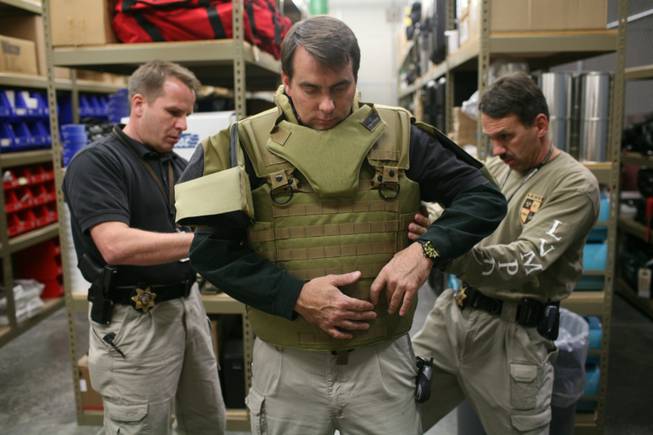
Detective Jeff Vialard of Metro Police, center, tries out new tactical body armor at the new anti-terror center in Las Vegas. He gets help from Detective Robert Lawson, left, and Detective Rick Breeden.
Tuesday, Jan. 22, 2008 | 2 a.m.
Sun Archives
Related Content
With months of acrimony behind them, Gov. Jim Gibbons and local law enforcement officials are coming together this week to embrace a new cooperative approach to fighting terrorism on the home front.
Gibbons is scheduled to attend today’s grand opening of the Southern Nevada Counter-Terrorism Center, a multijurisdiction operation headed by Metro Police that is designed to improve the gathering and sharing of intelligence among law enforcement agencies.
The 24,000-square-foot center, in an office complex near McCarran International Airport, is one of more than three dozen federally funded “fusion centers” that have sprung up across the country since the 9/11 terrorism attacks.
The concept behind a fusion center is to put representatives from local, state and federal law enforcement agencies under one roof, where they can share anti-terrorism intelligence and information sources.
Authorities plan to show local dignitaries how it all works at an open house this morning.
So far, 60 analysts and investigators from nearly a dozen agencies, including Metro Police, the FBI, the U.S. Homeland Security Department and the Nevada Emergency Management Division, are working at the two-story facility, which can comfortably seat 79.
“I can’t help but think that this community is safer right now,” said Metro Counter-Terrorism Lt. Tom Monahan, who has spearheaded the planning and operation of the high-tech Las Vegas center for two years. “It’s a lot easier to forge a relationship when you talk to somebody face to face rather than over the telephone or through e-mails.”
Metro Detective Jeff Vialard, a member of a weapons of mass destruction unit assigned to the fusion center, said the information flow improves by the day.
“The data and communication stream is right here,” Vialard said. “We’ve got the intelligence component, the investigative component and the response component all in one facility.”
On both floors of the operations center, agency representatives sit in adjoining cubicles with computers connected to the same network. Around the walls of the room above them are 46-inch LCD screens that monitor national and worldwide TV network reports and, by this week, will start displaying crime and intelligence data.
In a crisis, anti-terrorism investigators on the first floor would be sent into the field while second-floor analysts monitor the steady flow of information coming into the center.
Authorities will have quick access to a variety of protective gear and mobile command center vehicles -- one equipped with a $140,000 bomb-detecting robot -- stationed in an 8,000-square-foot warehouse in the building.
The intelligence center, jump-started with $4.6 million in federal funding, is one of three fusion hubs planned for the state. A smaller version of the Las Vegas operation is to open soon in Reno, and the Nevada Board of Examiners this month approved the use of $344,000 in state money to set up a still smaller hub in Carson City.
Gibbons last year sought to make the Carson City hub the state’s primary contact with federal homeland security officials -- a move that drew opposition from Clark County Sheriff Doug Gillespie and Washoe County Sheriff Mike Haley, who argued the Las Vegas counterterrorism facility was best-suited for that role.
After weeks of discussions, Gibbons softened his position and agreed to allow the Carson City center to play a secondary role to Las Vegas’.
All three centers will simultaneously receive the same intelligence from Washington. Each center, however, will have its own anti-terrorism responsibilities. Las Vegas will take the lead in dealing with threats in Southern Nevada; Reno, with threats in Northern Nevada; and Carson City, with threats in the rural counties.
Gillespie is quick to proclaim the Las Vegas center a success.
“Having the ability to exchange information and push it out throughout the valley is a great thing for us,” he said. “It’s only going to grow and get better.”
Like many fusion centers across the country, the Las Vegas operation is taking an “all-crimes, all-hazards” approach to fighting terrorism.
Authorities have the ability to monitor crime trends in the valley and match that data with intelligence from around the world to see whether there are any connections.
The center played a key role in assessing potential terrorism threats here before the massive New Year’s Eve celebration on the Strip.
Gillespie said the intelligence-gathering operation, in its first few months, also has improved the police department’s ability to fight local crime.
The center speeded up the dissemination of information to police agencies throughout the valley recently on separate waves of armed robberies and hair salon burglaries, Gillespie said.
And last week, the Counter-Terrorism Center helped authorities track the movements of former President Clinton and Democratic presidential candidates Hillary Clinton and Barack Obama, all of whom have Secret Service protection, while they campaigned here for the Democratic caucus.
As pleased as he is about the center’s initial progress, Gillespie said authorities don’t plan to be complacent.
“We have to continue to challenge ourselves to build upon this foundation,” he said. “We’ve got to continue to make it better.”

Join the Discussion:
Check this out for a full explanation of our conversion to the LiveFyre commenting system and instructions on how to sign up for an account.
Full comments policy